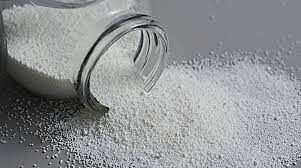Calcium propionate is a salt that is formed by combining calcium hydroxide with propionic acid. It is commonly used in the food industry as a preservative to prevent the growth of mold and bacteria in bread and other baked goods.
Is Calcium Propionate Vegan?
The answer to this question is not straightforward, as it depends on your personal beliefs and values regarding veganism. Here are a few factors to consider when deciding whether calcium propionate is vegan:
Source of Calcium
Calcium is a mineral that is essential for good health. It can be obtained from a variety of sources, including dairy products, leafy greens, and supplements. Calcium propionate is derived from calcium, which is typically obtained from limestone, a sedimentary rock.
Source of Propionic Acid
Propionic acid is a naturally occurring substance that is found in small amounts in certain foods, such as cheese and some types of bread. However, most of the propionic acid used in food production is produced synthetically from petrochemicals.
Alternatives to Calcium Propionate
If you are uncomfortable using calcium propionate, there are several alternatives that you can use in its place. These include:
- Vinegar: vinegar is a natural preservative that can be used to prevent the growth of mold and bacteria in bread and other baked goods.
- Citric acid: citric acid is a naturally occurring substance that is found in citrus fruits. It can be used as a preservative in baked goods.
- Ascorbic acid: also known as vitamin C, ascorbic acid can be used as a preservative in bread and other baked goods.
Why is Calcium Propionate Used in Food Production?
Calcium propionate is used as a preservative in the food industry to prevent the growth of mold and bacteria in baked goods, such as bread and rolls. This helps to extend the shelf life of these products and reduce food waste. In addition, calcium propionate has a mild flavor that does not affect the taste of baked goods.
How is Calcium Propionate Made?
Calcium propionate is made by combining calcium hydroxide with propionic acid. The calcium hydroxide is first dissolved in water to create a solution, which is then mixed with propionic acid. The resulting mixture is then heated and allowed to cool, which causes the calcium propionate to crystallize.
Is Calcium Propionate Harmful to Human Health?
Calcium propionate is generally recognized as safe by the FDA, and is considered a safe food additive when used in appropriate amounts. However, some people may experience mild allergic reactions, such as skin rashes or gastrointestinal discomfort, when consuming products that contain calcium propionate.
How to Determine if a Product Contains Calcium Propionate?
If you are unsure whether a product contains calcium propionate, you can check the ingredient label on the packaging. Calcium propionate is usually listed as an additive or preservative, and may be listed by its E number, E282. Some products may also state whether they are free from certain preservatives, including calcium propionate.
Are There Any Vegan Foods that Contain Calcium Propionate?
Yes, some vegan bread and baked goods may contain calcium propionate as a preservative. It is important to read ingredient labels carefully and do research on the manufacturing processes used to create certain foods to determine whether they align with your vegan lifestyle.
For those who are uncomfortable with using calcium propionate in their food products, there are several alternatives available. One option is to use natural preservatives, such as vinegar or lemon juice, which can help to inhibit the growth of mold and bacteria. Other alternatives include sodium propionate, potassium sorbate, and sorbic acid.
Ethical Concerns and Calcium Propionate
Some vegans may choose to avoid calcium propionate due to ethical concerns related to animal testing. While calcium propionate itself is not derived from animal products, it may have been tested on animals during the manufacturing process. Some vegan advocacy organizations recommend avoiding all food additives and preservatives, including calcium propionate, in order to support a cruelty-free lifestyle.
Calcium Propionate in Non-Vegan Foods
Calcium propionate is commonly used in non-vegan foods, such as bread and other baked goods. It is also used in processed meats, such as sausages and hot dogs, to inhibit the growth of bacteria. For those who follow a vegan lifestyle, it is important to carefully read ingredient labels and avoid products that contain calcium propionate.
Conclusion
Calcium propionate is a common preservative used in the food industry to extend the shelf life of baked goods and other products. While it is generally recognized as safe by the FDA, some vegans may choose to avoid it due to ethical concerns related to animal testing. There are several alternatives available for those who wish to avoid calcium propionate, including natural preservatives and other food additives. As with any dietary choice, it is important to do research and read ingredient labels carefully in order to make informed decisions that align with your values and dietary preferences.

